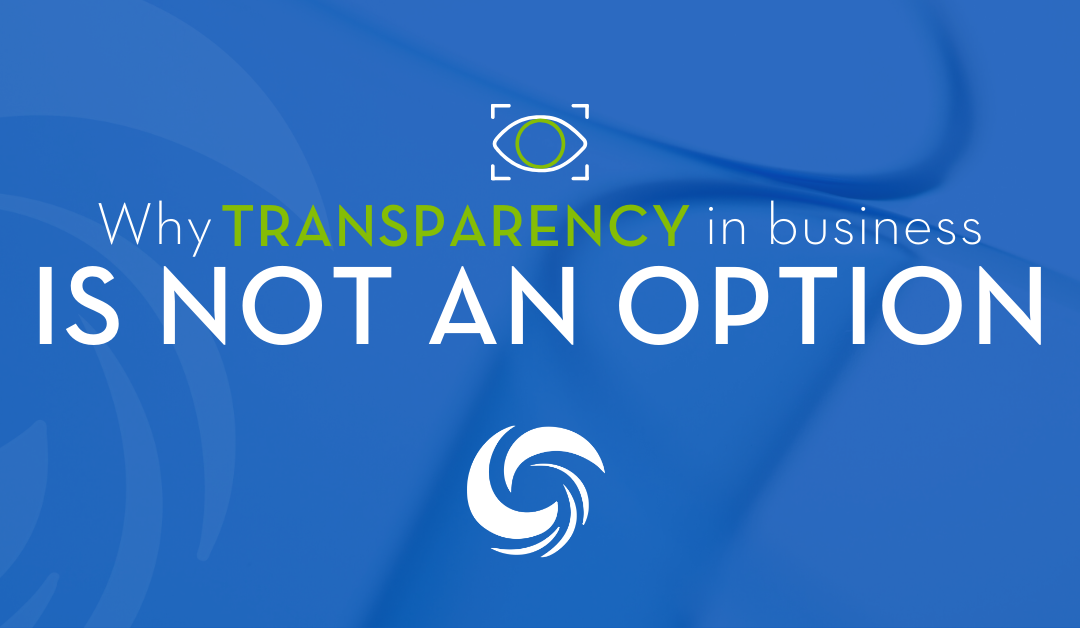The word transparency can carry different connotations, and an employee might define transparency differently than a c-suite executive. No matter what stories we can tell about transparency in our own business relations or company culture, there is no doubt that transparency has become inherent to business, and expected by consumers, managers, partners, and clients. It’s not as simple as telling the truth or disclosing all company information. It’s about making transparency the foundation of every conversation and consistently demonstrating how your company is transparent in nature. Transparency in business is not an option anymore; transparency has become a value that is in demand, and it’s up to leaders to ensure that transparency is a major part of your playbook.
Transparency builds trust
Trust has always been a crucial part of building a strong company culture and developing meaningful business relationships. Brand transparency is a way to strengthen trusting bonds with your followers, as Amazon reviews and social media activity have become important to consumers’ purchasing decisions. According to a Sprout Social survey, “86% of Americans believe transparency from businesses is more important than ever before. When brands are transparent and develop a history of transparency, almost 9 out of 10 people are more likely to give them second chances after bad experiences and 85% are more likely to stick with them during crises.” When it comes to business partnerships, trust is what can demonstrate credibility and reliability, which provide a solid foundation for expanded relationships. Implementing trust and transparency into your business partnerships will allow you to grow your business through valuable relationships that are standing on strong ground. Clients want a partnership that is built on productive collaboration, consistent and open communication, and the freedom of equal information sharing. How is your business prioritizing transparency to build trust?
A shared vision connotes transparency
So what does transparency mean to the general public? In the Sprout Social survey, when asked about defining transparency, openness (59%), clarity (53%), honesty (49%), authenticity (26%), integrity (23%), and communication (19%) were the top selected components of transparency. Keeping your strategy behind lock and key is not a way to boost transparency in business. Your team will be more engaged and committed to your company’s vision if they can connect with it on a detailed level. Updates and open communication regarding company strategies, future goals, and current challenges will allow employees to feel associated with the growth of your company. Enhanced engagement and connectedness can lead to increased productivity, boosted creativity, and heightened motivation to contribute to the company’s growth. Sharing your vision for an employee’s career track, the company Q4 goals, or the future of a business partnership will allow the other side to feel equally compelled to share and they will find confidence in their involvement with your business. Are you sharing enough of your vision of your business with those involved?
Transparency highlights your values
Your company values act as a compass that leads your business to growth. It’s a beacon of how your company operates and what characteristics it values the most. Whether you’re dealing with being open about how your product is made, healthcare transparency, or what foundation your strategy is built on, transparency gives you an outlet to showcase your values and give your employees and future clients something to grasp. Your company values mean everything in our current climate of distrust, privacy concerns, and untrustworthy news sources. Employees want to work for a company that has similar values and partners want to close a deal with a business that feels good. Transparency gives you the opportunity to share stories, discuss your goals, and create relationships that reflect your values without having to create a bulleted list of what your core “why” means to your company. Demonstrating your values through transparency can be what sets you apart from your competitors and can act as your differentiating factor in the market. What does your company stand for and what values does your business prioritize?
Encourage candor and information sharing in all of your business endeavors and in-house relationships. Transparency isn’t an option; it’s a necessary tool that will make your company stronger. The act of being transparent will outweigh all of the risks that come along with it. The Dalai Lama says it best “A lack of transparency results in distrust and a deep sense of insecurity.” Be transparent with your investors, employees, partners, and clients, and you will reveal the best version of your company and the strongest relationships that will stand the test of time.

